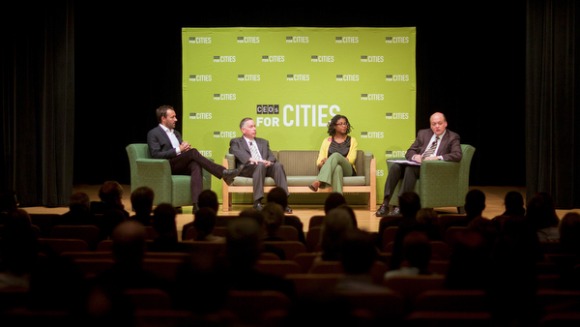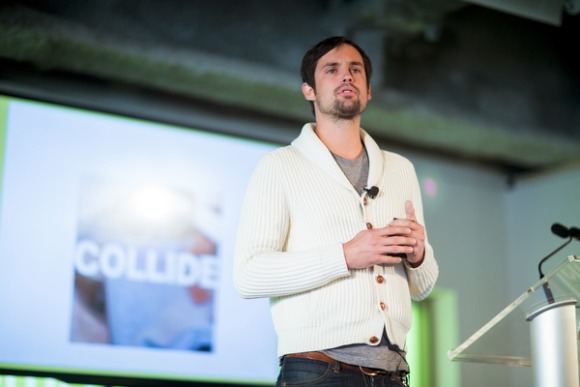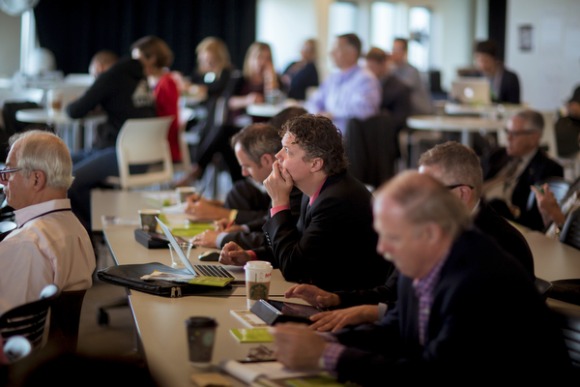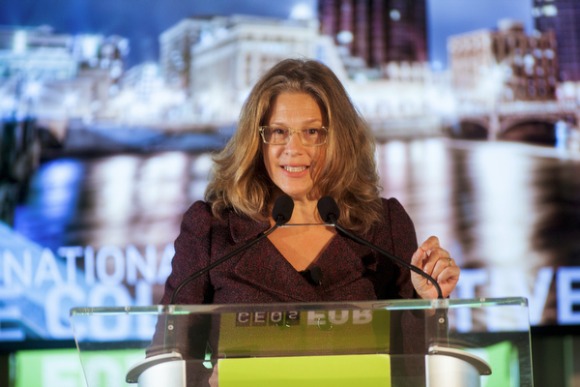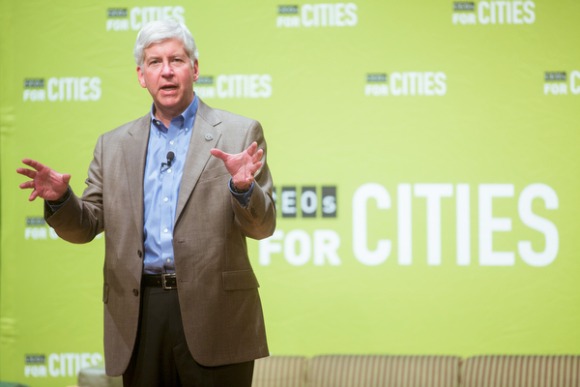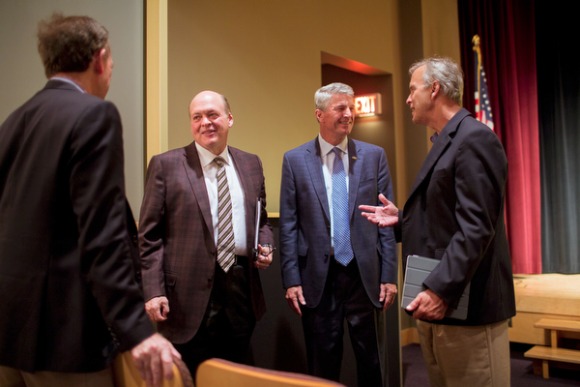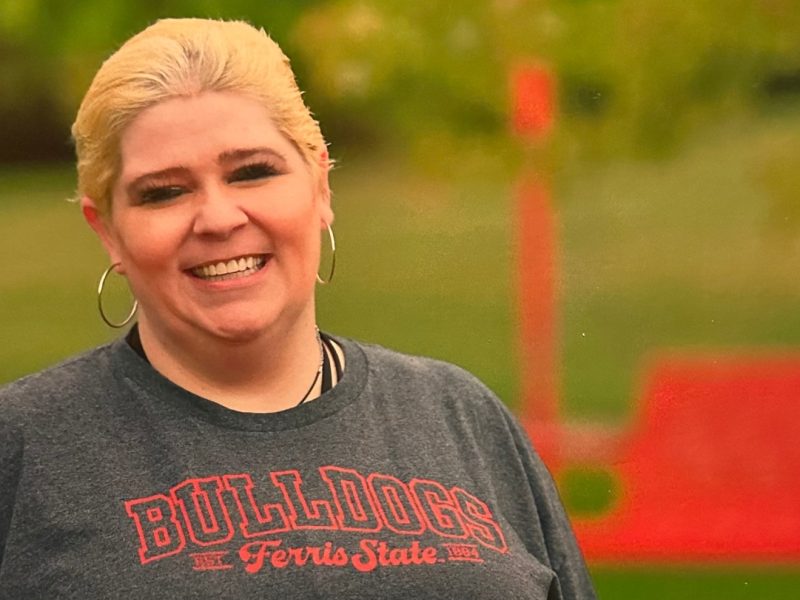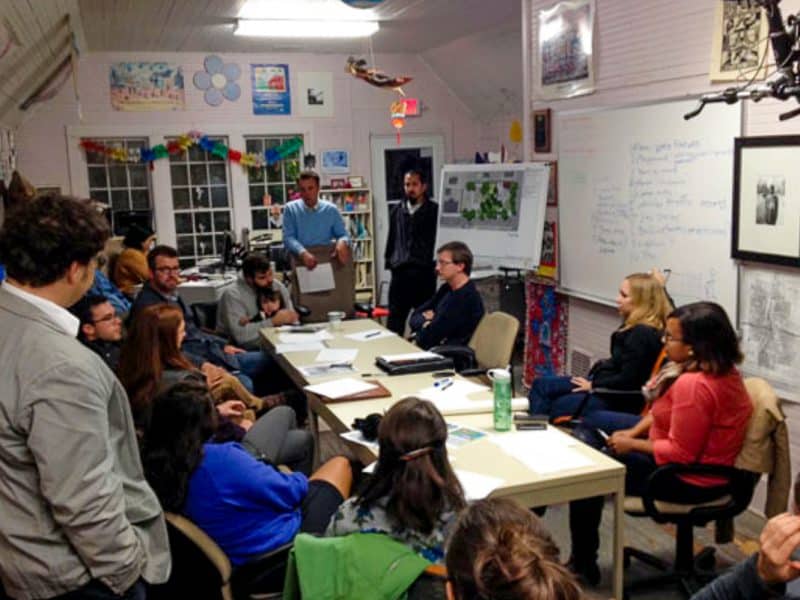CEOs for Cities: Looking at Grand Rapids through a new lens
CEOs for Cities held its fall national meeting in Grand Rapids this week for the first time ever, and the city put its best foot forward as attendees discussed "The Art of the Collaborative City." Now that the guests have headed home, how does Grand Rapids apply some lessons learned to build an even better place to live?
Perched atop the still-unfinished 7th floor of the MSU College of Human Medicine early this week, a group of mayors, corporate CEOs, nonprofit leaders, and community visionaries had a unique view of downtown Grand Rapids. And as the sun rose over the city skyline, the smart and curious crowd at CEOs for Cities had the kinds of conversations that will allow Grand Rapids to look at itself through a new lens going forward.
“You’re here at a fascinating moment in our city’s history,” said Grand Rapids Mayor George Heartwell as he welcomed representatives from 75 cities and 13 mayors to the meeting. It’s a comment that could be taken a couple of ways. Heartwell went on to explain that Grand Rapids is “just coming out of a recession” and is positioned to succeed in a variety of industries, including healthcare, research, and manufacturing. But there’s another compelling reason the group chose to be in Grand Rapids at this “fascinating moment” as well: ArtPrize.
“Specifically, [CEOs for Cities] coming to Grand Rapids during ArtPrize was orchestrated to coincide with the growing recognition nationally that art plays a critical role in the revitalization of neighborhoods and cities,” said Rick Baker, President/CEO of the Grand Rapids Area Chamber of Commerce. “We heard from several conference attendees how art has dramatically reduced crime and stimulated investment in neighborhoods.”
Conference organizers intentionally built time into the schedule for attendees to interact with the city, a tactic that’s becoming increasingly common here in Grand Rapids, with TEDxGrandRapids and MidwestUX also inviting speakers and audiences alike to immerse themselves in our city when they visit. It’s just one way to send visitors home with a new impression of Grand Rapids, which is the smallest city to ever host the CEOs for Cities conference.
So what did CEOs for Cities visitors think of our fair city? “The common denominators were the cleanliness, the unique diversity of our architecture, and the pride Grand Rapids’ citizenry had for its city, especially those they came in contact with in our restaurants and night spots,” said Doug Small, President and CEO of Experience Grand Rapids. “Obviously they were positively ‘taken aback’ by the popularity of ArtPrize and the ongoing enthusiasm of those attending the event.”
Keynote speaker Bruce Katz concurred, opening his talk by saying he was “stunned by Grand Rapids.” Katz, co-author of “The Metropolitan Revolution,” used his time on stage to share a city-focused message that resonated particularly well during a week that saw the shutdown of the federal government. After warning that, within ten years, more than half of the federal government’s budget will be eaten up by entitlement spending obligations, Katz declared “cities will have to compensate.”
“As we go forward, the challenge is, how do we power forward without the federal and state government?” Katz encouraged cities to be ready to innovate and collaborate at the local level and depend on its networks, something Grand Rapids already does quite well.
Rosalynn Bliss, a CEOs for Cities attendee and a second-term Grand Rapids City Commissioner, sees evidence of this. “Over the years, I’m already starting to see a shift in responsibility from the national to the local level,” said Bliss, citing efforts to support Grand Rapids Public Schools, Grand Raids Community College, and local transit programs via local millage initiatives and partnerships. She thinks the message of the conference is the reminder that “we all have a role to play” in our city’s success and touts “the rich legacy of people who are so committed to our city” as the secret to Grand Rapids’ recent growth and progress.
Baker, too, thinks Grand Rapids is ahead of the curve in fostering its local networks. “Grand Rapids has numerous informal networks that support and encourage creativity. In fact, informal networks are the better model; putting a structure around a network would run counter to the creativity. The informality of the ‘collisions,’ as many speakers referenced [today], is what gives the ownership to the masses,” said Baker.
These ‘collisions’ are one metric for measuring success that Zappos CEO Tony Hsieh shared with a packed ballroom at the JW Marriott, where he spoke at a luncheon hosted by the Grand Rapids Economic Club. Hsieh encouraged the audience to focus less on ROI (return on investment) and more on what he calls ROC (return on community) and ROL (return on luck) – the kinds of serendipitous collisions that foster creativity, connection, collaboration, and optimism.
“Fifty percent of humans live in cities today, and it’s going to be 75% in our lifetime,” said Hsieh. That’s why he says it’s key to create the kind of culture that makes for good neighborhoods and good cities, and why he says the keys to creating that culture are “collisions, community, and co-learning.”
It’s something the leaders involved with healthcare and medical research say they’re already trying to do, according to David Van Andel, Chairman and CEO of Van Andel Institute. “You can’t create entrepreneurs, but you can create a culture where entrepreneurs can be successful,” he said in a panel discussion on the Grand Rapids Medical Mile that also included the presidents of Spectrum Health System, Grand Valley State University, The Right Place, Michigan State University, and Trinity Health.
The panel cited talent attraction and recruitment as both a challenge and a success, with Spectrum President and CEO Roger Breon noting that “talent begets talent” and GVSU President Thomas Haas receiving hearty applause for his announcement that 75% of the university’s most-recent graduating class is working right here in West Michigan and 84% of grads are staying in the state. “We’re seeing brain gain instead of brain drain,” said Haas.
But CEOs for Cities isn’t just a platform for celebrating success. There is still work to be done in our city, and leaders weren’t shy about having those conversations as well.
Keynote speaker Anil Menon cautioned cities not to ignore the incredible potential of the digital revolution to drive innovation at the city level. Noting that there are now more digital devices than humans in the world, Menon said, “What I see across the globe is cities focusing on physical infrastructure, while their focus on digital infrastructure is minimal.”
Another challenge for Grand Rapids going forward will be increasing its diversity, said Baker. “Grand Rapids has progressed in openness and inclusiveness, but we are not where we need to be to change our image of a closed community,” he says. “Our success as a region will depend on our ability to embrace our diversity and provide equitable opportunity for success.”
While some of the success stories at CEOs for Cities are big, splashy initiatives like Tony Hsish’s ambitious plans for downtown Las Vegas, many of them are locally grown, neighborhood organizations who build success one person at a time. A panel on City Success Stories reminds us that, from Des Moines to Detroit and from Portland to Cincinnati, it’s the residents of a city – like Detroit’s Phillip Cooley and Portland’s Erin Flynn – who need to be the culture-changers.
So as Grand Rapids basks in its recent rankings on top-ten lists and welcomes thousands of visitors to ArtPrize and conferences each year, one key to its continued success will be at the neighborhood level. Both Breon and Haas advocated for more affordable housing within walking distance of the Medical Mile and downtown universities, and Bliss echoed their concerns as well.
“We have to support neighborhoods” in conjunction with all our growth, she cautioned. Bliss hopes, going forward, Grand Rapids will strike a balance between large-scale development and the needs of the individual neighbor on the block.
“The people are the city,” she said. And the city looked pretty gorgeous through the lens of CEOs for Cities this week.
Disclosure: Issue Media Group, Rapid Growth’s parent company, is a media partner of CEOs for Cities.
Stephanie Doublestein is the managing editor of Rapid Growth Media.
Photography by Adam Bird

